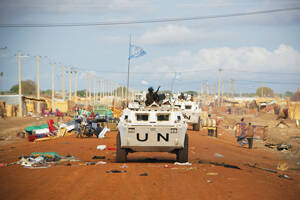The burning and looting of the abandoned town of Abyei in central Sudan, perched precariously on the disputed border between north and south Sudan, has been condemned by the United Nations. Almost the entire population of Abyei fled to the south after Sudanese armed forces rolled into the town with heavy weapons and 15 tanks and shelled civilian areas on May 21. The attack was in response to an ambush on May 19 of a column of northern troops, apparently by forces loyal to the Southern People’s Liberation Army, that left at least 22 dead.
The U.N. mission in Sudan is reporting that the upsurge in violence has displaced “possibly hundreds of thousands” of civilians. The United Nations also reports that north Sudanese forces are moving thousands of members of the Misseriya tribe into the abandoned town, perhaps in an effort to perform ethnic cleansing of the province of its Ngok Dinka population and alter the dynamics of any referendum on Abyei’s future.
On May 23 the U.S. State Department’s special envoy for Sudan, Princeton Lyman, deplored the southern attack, but condemned the northern response as disproportionate and irresponsible. “This is a very serious violation of the [2005] Comprehensive Peace Agreement, and it certainly jeopardizes the process of negotiation that had been underway to resolve the remaining issues before the South becomes independent on July 9,” he said. Lyman called on the north to withdraw from the province and return to negotiations. The occupation of Abyei, he said, seriously jeopardizes progress on the normalization of U.S.-Sudan relations, including a commitment to remove Sudan from the State Department’s list of state sponsors of terrorism upon the successful fulfillment of the 2005 accord.
Stephen Hilbert, a foreign policy advisor with the U.S. bishops’ Office for International Justice and Peace, said it was well known that Abyei was the psychological and political flashpoint that could reignite conflict in Sudan. He applauded the quick reaction of the U.S. State Department and expressed hope that renewed multilateral attention forced by the weekend crisis could still lead to a successful conclusion of the peace process. He said, “What the bishops have consistently said is that the United States needs to continue intensive engagement and show constant leadership in making sure that all the stipulations of the Comprehensive Peace Accord are met.”
That agreement ended decades of civil war and set the groundwork for a referendum on independence for the primarily Christian and traditionalist south. Southerners voted overwhelmingly for independence in January. Abyei was supposed to conduct a parallel referendum, but that vote never took place, as leaders from the north and south could not agree on the eligibility of the Misseriya population. The Arab Misseriya are pastoralists who move through the province seasonally to graze their livestock. Abyei’s permanent residents, the Ngok Dinka, are presumed to favor independence with the south.
Dan Griffin, Sudan’s country representative for Catholic Relief Services, said it is unclear how much of C.R.S.’s supplies in Abyei survived the northern attack. The incursion complicates an already difficult logistical challenge, he said. Sudan’s rainy season has just begun, and the agency was already attempting to aid 15,000 residents from Abyei who had been dislocated by previous skirmishes.
Since the intentions of the north remain unclear, Griffin said C.R.S. was still trying to decide where to begin setting up a humanitarian response to this latest crisis. “We have to get supplies there quickly,” he said; but “it’s like fighting a fire: How close can we get without being hurt?”
Perhaps most worrisome is what the attack suggests about the faltering peace process. Hilbert said it was still possible to pull back from the brink, but according to Griffin, for many in the south the attack confirms that Khartoum has not been negotiating in good faith and that many of the peace accord’s outstanding issues will be concluded at the end of a gun barrel, not the end of a bargaining table.








